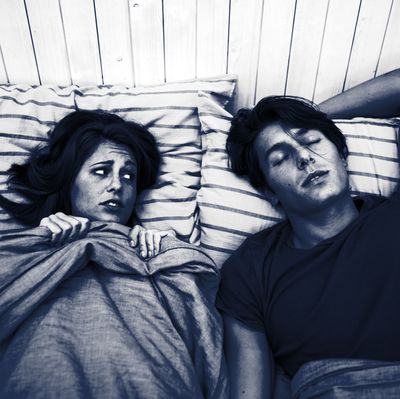
A few things that can wreck a good night’s sleep? Caffeine, sure. Stress and anxiety, definitely. Being in a relationship … well, yes, now that you mention it.
Specifically, it’s the bed-sharing that messes things up. Simply put, sharing a bed means waking up more. In one 2007 study, nearly half of participants reported that they’d been woken up by their partner’s movements, noises, or activities.
This presents an unfortunate predicament: You want to be able to sleep through the night, but you also want to keep on sleeping next to your partner. Ultimately, research suggests, most people end up choosing the latter, either because it’s what’s expected of couples or because they believe it’s better for the relationship.
In some cases, that can mean sharing a bed with someone who’s aggressive or violent during sleep, says Carlos Schenck, a psychiatry professor at the University of Minnesota who’s written extensively about sleep disturbances. In his work, he’s frequently encountered people who want to continue sleeping next to their significant other, even when that means getting (inadvertently) elbowed or punched all night. Much of the time, he says, it’s because they want to help their partners deal with their sleep disturbances.
But this is one good intention that often backfires. Not getting enough sleep can easily turn someone into the worst version of themselves, and, by extension, make them a worse, less understanding partner: Sleep deprivation can take a toll on your sense of humor, your empathy, and your ability to make decisions, all of which can create additional relationship problems.
“It’s definitely true that sleep problems can cause relationship distress,” says Wendy Troxel, a clinical psychologist and behavioral sleep-medicine specialist. “Sleep problems have profound effects on daytime functioning, including how you get along with a partner.” In her research, she explains, she’s found that “more maritally satisfied couples were more likely to be in sync at night.”
In some severe cases, sleep incompatibility doesn’t just amp up the stress — it can directly lead to relationship breakdown. This includes cases where people with sleep issues are seriously troubled by the way their partners respond.
In 1986, Schenck was part of the Minnesota research team that first identified REM sleep behavior disorder (RBD). In RBD, sleepers lose the protective mechanism that keeps them essentially paralyzed. This means that their muscles are active rather than paralyzed during sleep, and they can act out their dreams, sometimes violently. (RBD has been linked to antidepressant use, and can be an early sign of Parkinson’s disease and dementia.)
In 2004, Schenck co-authored a report on the first documented case of RBD leading to a suicide attempt. The case centered on a Taiwanese woman in her 30s, who had a long history of moving her arms and shouting during her sleep; eventually, after sustaining one too many punches, her husband began sleeping in a separate room. She felt so guilty about her troubled sleep, and its effects on her marriage, that she developed depression and eventually attempted suicide. Importantly, she said that troubled sleep was their only marital problem, and she had no other history of psychiatric instability. Thankfully, the tranquilizer clonazepam resolved her RBD — and by extension, her depression — and the couple was then able to go back to sharing a bed.
A different case, described in a 2010 report also co-authored by Schenck, involved an Italian man in his 20s who would punch his wife in his sleep. Numerous tests supported his diagnosis of RBD, but, as the report notes, his wife “really did not believe that he did not do this intentionally,” eventually filing for divorce and bringing criminal charges against him. While the man was ultimately acquitted, the marriage ended.
Another sleep disturbance that can drive couples apart is sexsomnia, a disorder in which people initiate sexual activity while asleep and have no recollection of it when they wake up. As you might imagine, this one presents some particularly thorny legal issues: In a landmark 2013 case, for instance, a Danish man charged with groping two teenage girls sleeping in his apartment was acquitted after providing evidence that he suffered from sexsomnia. The disorder is recognized as a legitimate sleep condition, though some experts worry that it might be misconstrued or used disingenuously as a defense (Schenck and a colleague recently co-authored guidelines for sleep forensic experts). Even when a case of sexsomnia is genuine, it can be deeply troubling for all involved, partners included.
But it’s important to remember that these aren’t common cases. Schenck comments that only a small proportion of sleep-disorder cases involve aggression or violence. Troxel says that it’s also rare to see a genuine “sleep divorce,” and that in general, attributing a breakup just to sleep incompatibility “would oversimplify relationship rupture.” Still, even for more run-of-the-mill sleep-related problems, it can be helpful to treat them as a proxy for relationship troubles — while some people may be reluctant to undergo couples therapy or psychotherapy, just about everyone wants better sleep.




